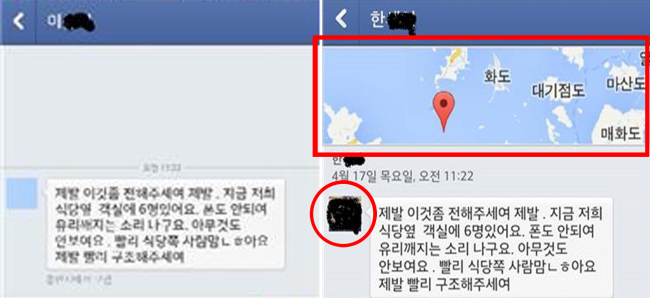[Ferry Disaster] Attention seekers invent stories after ferry disaster
By Suk Gee-hyunPublished : May 1, 2014 - 20:24

South Koreans’ frustration with narcissistic attention seekers has hit a fresh high after a flurry of frauds and lies that added confusion to the recent ferry disaster.
A woman who identified herself as a diver and made false claims about the ferry rescue operation on TV was arrested last month on charges of defamation and fraud.
But long before her arrest, she was recognized by many online who claimed that she had been involved in numerous fraud cases ― posing as an entertainment news reporter, the pregnant girlfriend of a baseball player and an entrepreneur involved in a 1 billion won ($970 million) scam. She was also interviewed on TV many years ago as a resident of Japan who was sad to leave her friends behind after the Fukushima crisis.
The woman’s erratic behavior is a symptom of narcissistic personality disorder, says Jeon Woo-young, a psychology professor at Chungnam National University.
With an increasing number of people causing real problems as a result of narcissism expressed online, the new terms “attention breed” and “8th grade disease” have been coined, referring to teenagers who recklessly seek attention.
After the ferry Sewol sank, there were also text messages and online posts by people claiming to be passengers trapped inside the ferry. Police later confirmed them to be fake, touching off fierce public criticism against people who used the tragedy to get attention.
“Posting sensational photos or writing made-up stories is all due to one’s desire to garner public attention,” Jeon said.
The term “narcissism” originated from the cautionary tale of Narcissus, a hunter who fell in love with his own reflection in a pool and drowned after gazing into the still water.
“Everyone enjoys a certain level of attention from others. But recently, (due to SNS) it has become easier to satisfy this desire and some are having difficulty controlling their need for an inflated sense of self-importance,” Jeon explained.
In many ways, the behaviors have been boosted by social network services, which allow one to create a profile and provide highly visual information about one’s life.
According to Park Chang-ho, an information sociology professor at Soongsil University in Seoul, the Internet is the primary platform people use to interact and reveal themselves.
“There have been numerous posts about dramatic stories (like people writing a suicide note), but they have all turned out to be fake,” Park said.
“The Internet has become the starting point for telling others who we are. And some people cannot control their self-satisfaction and exhibitionism online,” Park said.
By Suk Gee-hyun (monicasuk@heraldcorp.com)
A woman who identified herself as a diver and made false claims about the ferry rescue operation on TV was arrested last month on charges of defamation and fraud.
But long before her arrest, she was recognized by many online who claimed that she had been involved in numerous fraud cases ― posing as an entertainment news reporter, the pregnant girlfriend of a baseball player and an entrepreneur involved in a 1 billion won ($970 million) scam. She was also interviewed on TV many years ago as a resident of Japan who was sad to leave her friends behind after the Fukushima crisis.
The woman’s erratic behavior is a symptom of narcissistic personality disorder, says Jeon Woo-young, a psychology professor at Chungnam National University.
With an increasing number of people causing real problems as a result of narcissism expressed online, the new terms “attention breed” and “8th grade disease” have been coined, referring to teenagers who recklessly seek attention.
After the ferry Sewol sank, there were also text messages and online posts by people claiming to be passengers trapped inside the ferry. Police later confirmed them to be fake, touching off fierce public criticism against people who used the tragedy to get attention.
“Posting sensational photos or writing made-up stories is all due to one’s desire to garner public attention,” Jeon said.
The term “narcissism” originated from the cautionary tale of Narcissus, a hunter who fell in love with his own reflection in a pool and drowned after gazing into the still water.
“Everyone enjoys a certain level of attention from others. But recently, (due to SNS) it has become easier to satisfy this desire and some are having difficulty controlling their need for an inflated sense of self-importance,” Jeon explained.
In many ways, the behaviors have been boosted by social network services, which allow one to create a profile and provide highly visual information about one’s life.
According to Park Chang-ho, an information sociology professor at Soongsil University in Seoul, the Internet is the primary platform people use to interact and reveal themselves.
“There have been numerous posts about dramatic stories (like people writing a suicide note), but they have all turned out to be fake,” Park said.
“The Internet has become the starting point for telling others who we are. And some people cannot control their self-satisfaction and exhibitionism online,” Park said.
By Suk Gee-hyun (monicasuk@heraldcorp.com)












![[Today’s K-pop] BTS pop-up event to come to Seoul](http://res.heraldm.com/phpwas/restmb_idxmake.php?idx=644&simg=/content/image/2024/04/17/20240417050734_0.jpg&u=)




![[KH Explains] Hyundai's full hybrid edge to pay off amid slow transition to pure EVs](http://res.heraldm.com/phpwas/restmb_idxmake.php?idx=652&simg=/content/image/2024/04/18/20240418050645_0.jpg&u=20240419100350)

![[Today’s K-pop] Zico drops snippet of collaboration with Jennie](http://res.heraldm.com/phpwas/restmb_idxmake.php?idx=642&simg=/content/image/2024/04/18/20240418050702_0.jpg&u=)